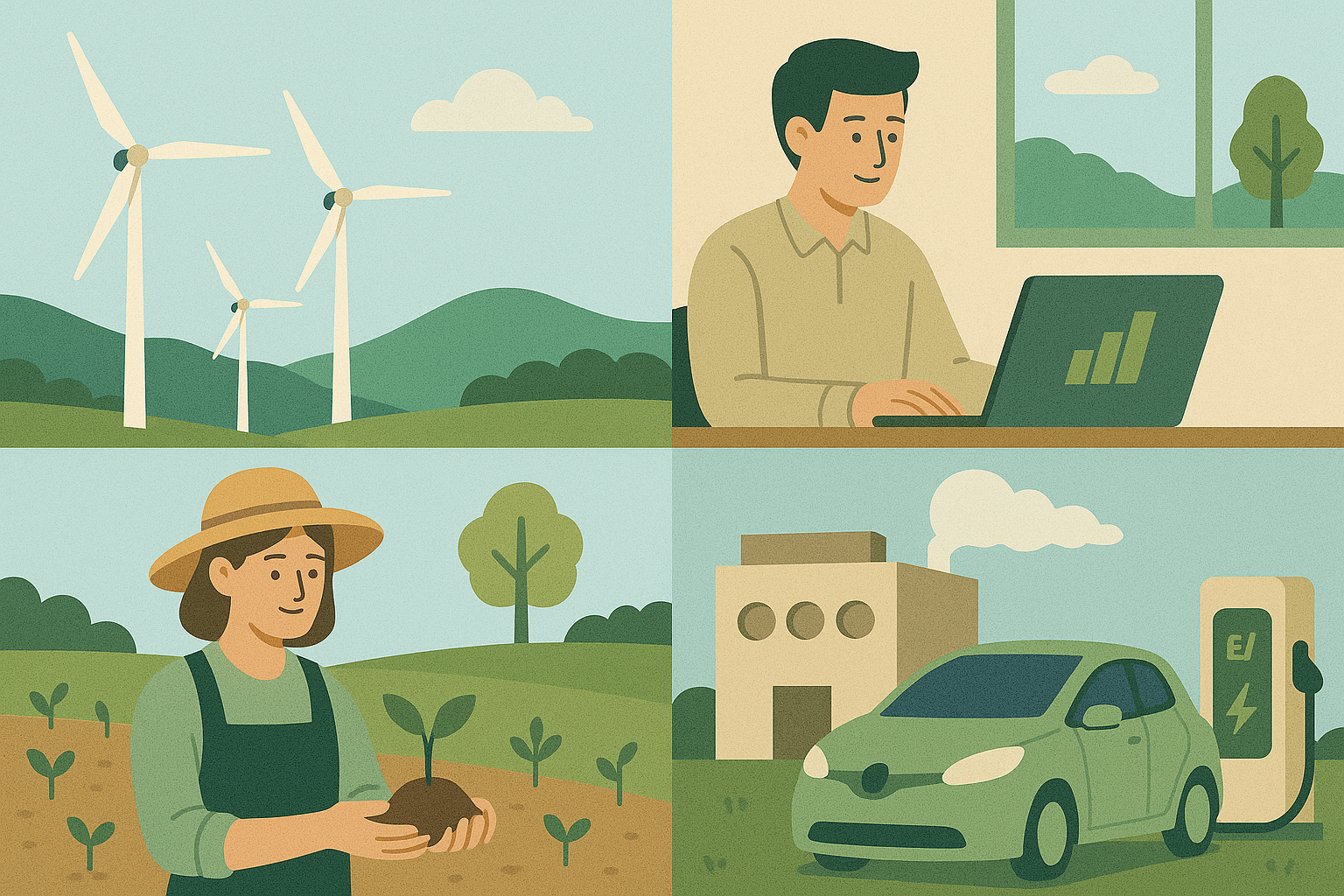Betting Big on Climate Tech | 매거진에 참여하세요
Betting Big on Climate Tech
#climate #tech #earch #sustain #commercial #idea #startup
Not long ago, the word “sustainability” was tucked away in CSR reports like a corporate afterthought.
But now? It's on the frontlines of global business, policy, and technology.
Climate change is no longer an abstract threat. Forty-degree summers are becoming the norm, not the exception.
And it’s not just happening “somewhere in Africa” anymore—it’s happening here, in real time.
The era of burning energy to generate profit is fading fast. Instead, we're entering a new paradigm: making money by reducing carbon.
Welcome to the climate tech revolution.
So, What Exactly Is Climate Tech?
Climate tech goes beyond “green” or “clean” tech. At its core,
it refers to technologies and business models that directly address climate change—either by reducing emissions,
adapting to its consequences, or both.
Here’s a broad breakdown of the key categories:
- Renewable Energy: Tech that improves the efficiency of solar, wind, hydro.
- Carbon Capture & Utilization (CCUS): From direct air capture to industrial reuse of CO₂.
- Circular Economy: Recycling plastics, turning food waste into fertilizer or feed.
- Food Tech: Cultivated meat and plant-based proteins to curb methane emissions from livestock.
- Energy Efficiency: Smart grids, battery storage (ESS), and demand management.
- Climate Adaptation: AI-based disaster prediction, infrastructure for floods, droughts, and heatwaves.
What binds them together is the need for scale. Real impact in climate tech demands R&D, regulatory support, and a whole lot of capital.
Follow the Money: Climate Tech's VC Boom
Since the early 2020s, climate tech has become one of the hottest spaces in venture capital.
According to PwC, 14% of global VC funding in 2022 went to climate tech—led by energy, mobility, and food innovation.
Let’s look at a few breakout stars and their backers:
Company | HQ | Recent Round | Funding | Major Investors | Tech Focus |
|---|---|---|---|---|---|
Northvolt | Sweden | Series E (2022) | $1.1B | Volkswagen, BMW, Goldman Sachs | EV Battery Manufacturing |
Climeworks | Switzerland | Private Equity (2022) | $650M | Baillie Gifford, Global Founders Capital | Direct Air Capture (DAC) |
Rivian | US | Pre-IPO Series F | $2.5B+ | Amazon, Ford | Electric Pickup Trucks |
Form Energy | US | Series E (2023) | $450M | Breakthrough Energy Ventures | Long-duration ESS |
Carbon Engineering | Canada | Private Placement (2021) | $68M | Chevron, Breakthrough Energy | CO₂ Capture & Synthetic Fuels |
Heliogen | US | SPAC IPO (2021) | $250M | Bill Gates, Prime Movers Lab | Solar Thermal for Industry |
Solugen | US | Series D (2023) | $200M | Temasek, Baillie Gifford | Carbon-negative Biochemicals |
M-KOPA | Kenya | Series E (2022) | $75M | CDC Group, Generation Investment | Off-grid Solar Access |
Watershed | US | Series B (2022) | $70M | Sequoia, Kleiner Perkins | Carbon Reporting SaaS |
Zero Mass Water | US | Series C (2021) | $150M | Breakthrough Energy | Solar-Powered Water Extraction |
From Tesla to Beyond Meat: What Success Looks Like

- Northvolt
is rebuilding Europe’s battery supply chain with a promise: energy independence from Asia.
- Climeworks
is scaling air-to-gas carbon capture with machines that literally suck CO₂ out of the sky.
- Rivian
found its niche in electric trucks, with Amazon placing massive orders for their delivery fleet.
- Form Energy
is tackling the intermittency problem of renewables with iron-air batteries that store power for days.
- Carbon Engineering
captures CO₂ and turns it into jet fuel—a circular twist on fossil-based aviation.
- Heliogen
is pushing solar to power heavy industries, like cement and steel, with extreme heat.
- Solugen
builds chemical plants without petroleum, relying instead on biology to slash emissions.
- M-KOPA
is proof that climate tech isn't just for the Global North—it brings solar power to off-grid homes in Africa.
- Watershed
is building tools for companies to track and report carbon emissions—like Google Analytics, but for CO₂.
- Zero Mass Water
creates potable water from thin air, powered by solar, for drought-prone regions.
It’s Not All Sunshine: The Climate Tech Challenges
Let’s be real. Climate tech isn’t a straight line to success.
- Hard to Scale:
Lab breakthroughs don't mean market readiness. DAC machines, for instance, require massive infrastructure and energy.
- Long ROI Horizons:
Unlike a typical SaaS startup, climate tech can take 10+ years to turn a profit.
- Regulatory Maze:
Different countries, different emissions standards. Scaling globally means navigating bureaucracy.
This is why climate tech isn't just about "technology"—it's about execution. The winners integrate policy, capital, and supply chains.
Why Emerging Markets Might Leapfrog

Surprisingly, the biggest growth opportunities aren’t only in the US or EU.
- In Africa
solar-powered microgrids beat fossil-fueled plants on flexibility and cost.
- In Southeast Asia
smart irrigation and climate prediction tech are critical for food security.
- In the Middle East
where water scarcity is existential, investment in hydroponics and alt-proteins is skyrocketing.
In these regions, climate tech isn’t replacing an old system—it’s building an entirely new one. That’s gold for investors.
The Real Insight: Climate Tech Is a Business Model
The future of climate tech isn’t just physical—it’s digital.
It’s not enough to just build a carbon capture plant. Someone has to:
Monitor and optimize emissions data in real time (hello, SaaS).
Build APIs to interface with carbon markets.
Offer ESG scoring platforms for financiers and regulators.
In other words, climate tech is shifting from hardware to platforms.
And the biggest winners will be those who make it easier for others to decarbonize.
Final Thoughts
Climate change isn’t an environmentalist’s issue anymore. It’s a business issue. A survival issue.
Some call climate tech the next internet. At first, it's slow and unprofitable—but once it touches every sector, it becomes indispensable.
Right now, startups, VCs, and governments around the world are planting the seeds of that future.
Because climate tech isn’t just about saving the planet—it’s about building the next one.
Do you need a climate tech startup idea?
→ bunzee.ai






